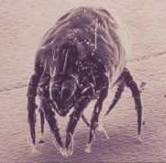- 8 Ways to Increase Dopamine Naturally
- 7 Best Breads for Maintaining Stable Blood Sugar
- Gelatin vs. Collagen: Which is Best for Skin, Nails, and Joints?
- The Long-Term Effects of Daily Turmeric Supplements on Liver Health
- Could Your Grocery Store Meat Be Causing Recurring UTIs?
- Are You Making This Expensive Thermostat Error This Winter?
- Recognizing the Signs of Hypothyroidism
- 10 Strategies to Overcome Insomnia
- Could Artificial Sweeteners Be Aging the Brain Faster?
- Techniques for Soothing Your Nervous System
Tips for Tackling Winter Allergy Triggers


Winter can be a difficult time for people with allergies, but they can take steps to reduce their exposure to indoor triggers such as mold spores and dust mites, experts say.
“During the winter, families spend more time indoors, exposing allergic individuals to allergens and irritants like dust mites, pet dander, smoke, household sprays and chemicals, and gas fumes — any of which can make their lives miserable,” Dr. William Reisacher, director of the Allergy Center at NewYork-Presbyterian Hospital and Weill Cornell Medical Center in New York City, said in a hospital news release.
“With the lengthening of the pollen season over the past several years, people with seasonal allergies might find their symptoms extending even further into the winter months,” Reisacher said.
People also need to look out for mold, another expert noted.
“Mold spores can cause additional problems compared to pollen allergy because mold grows anywhere and needs little more than moisture and oxygen to thrive,” Dr. Rachel Miller, director of allergy and immunology at NewYork-Presbyterian/Morgan Stanley Children’s Hospital, said in the news release.
“During the holiday season it is especially important to make sure that Christmas trees and holiday decorations are mold-free,” she said.
Miller and Reisacher offered the following tips to help allergy sufferers through the winter:
- Turn on the exhaust fan when showering or cooking to remove excess humidity and odors from your home, and clean your carpets with a HEPA vacuum to decrease dust mites and pet allergen levels. Mopping your floors is also a good idea.
- Wash your hands often, especially after playing with pets and when coming home from public places.
- Wash your bed linens and pajamas in hot water (above 130 degrees) to kill dust mites.
- Consider your bedroom the allergy “safe haven” of your home. Keep pets, carpets, rugs and plants out of your bedroom to avoid dust mites and mold from decaying plants. It is a good idea to place an allergenic barrier around your pillows and mattress to create a barrier between dust mites and your nose.
- Before putting up your Christmas tree, spray it with a garden hose and remove all dust from your holiday decorations.
- Install high-efficiency furnace filters. They capture 30 times more allergens. Also make sure your furnace fan is always on.
- Keep your indoor humidity level between 30 percent and 40 percent — using a humidifier or dehumidifier — to prevent mold growth. Change humidifier water and filters according to manufacturer recommendations to avoid mold and bacteria contamination.
- Survey your house indoors and outdoors monthly to look for visible mold, and identify areas that are at high risk for mold formation. Examples include a pile of firewood close to the house or an area of the basement with a musty smell.
More information
The U.S. National Institute of Environmental Health Sciences has more about allergens and irritants.
Source: HealthDay
Copyright © 2026 HealthDay. All rights reserved.










